Bad posture can probably cause lower back pain, shoulder pain, and neck pain (1). But the right posture exercises to improve posture can help treat these issues. Standing or sitting all day, working on a laptop not at your eye level, constantly looking down at your phone, low-quality or badly-designed mattresses, wrong chair structure, or ignoring your form while working out can affect your posture (2).The right exercises help reduce muscle pain and improve your balance and flexibility (3), (4). You can perform these 11 exercises at home for 30 days and improve your posture. Swipe up to check them out.
According to an online survey conducted with 544 Greek physiotherapists, 93.9% of participants feel education regarding optimal sitting and standing posture should be considered “considerably” or “very” important. As per the data, 97.5% and 98.2% of the participants selected three different sitting postures and two different standing postures as the optimal postures. The most commonly selected postures were all some variation of the upright sitting position.
Workout Blueprint: Exercises To Improve Your Posture
Frequency: Daily
Benefits: Correct spinal alignment, strengthen the back, and improve breathing.
Equipment Needed: Chair, mat, foam roller.
Space Required: Small area
Assistance Required: Yes, for certain exercises.
Who Should Avoid: Anyone with a history of back pain, shoulder issues, or knee injuries.
12 Best Exercises To Improve Posture
1. Chin Tuck For Forward Head Posture
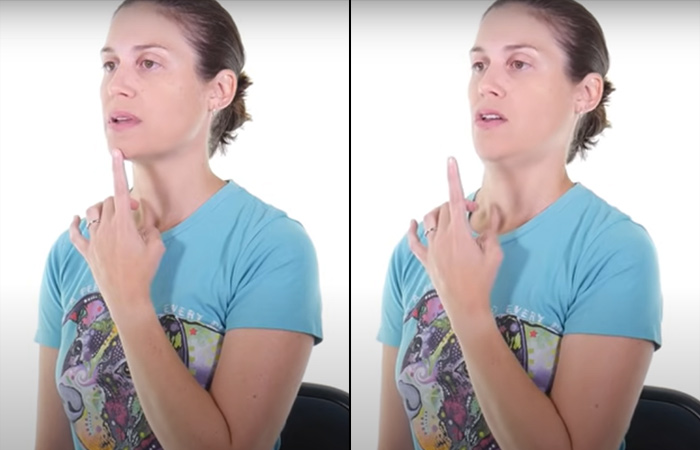
The forward head posture, also known as the nerd’s neck, occurs if you sit in one place for too long to read or play video games. Over time, the musculature in the front of your neck shortens and becomes overactive, while the muscles in the back of your neck lengthen. The neck tends to curve at the back, with the upper spine protruding out. Chin tucks help reduce neck curvature and spine protrusion by putting the muscles in the back of your neck to work and stretching the ones in the front a bit. Here’s how to do them:
- Sit on a chair and keep your feet flat on the floor and spine erect.
- Place your index finger on your chin lightly. This is the starting position.
- Push your head back without moving your index finger.
- Hold the pose for 3-5 seconds and return to the starting position.
- Do this 10 times twice a day.
- Consider adding a light resistance band to pull against over time.
2. Back Claps For Shoulder And Back
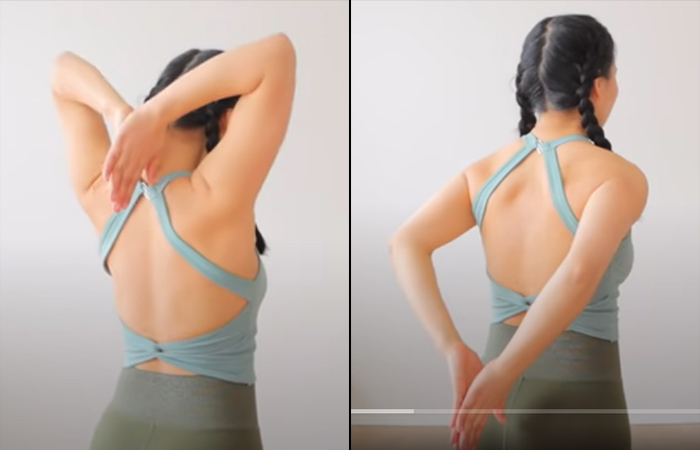
If you have drooping shoulders, stiffness, and a curved back due to improper posture, this exercise can help relax the spine and shoulder muscles and improve flexibility. Follow these steps for the exercise:
- Stand straight with your feet hip-width apart.
- Lift your hands and join them in a prayer pose behind your head.
- Hold for a second and release the pose.
- Again join your palms in a prayer pose behind your hips.
- Do this 10 times twice a day.
Note: If you have very stiff muscles and curved shoulders, this exercise might take a few days to master.
3. Child’s Pose For Shoulder, Spine, And Hip
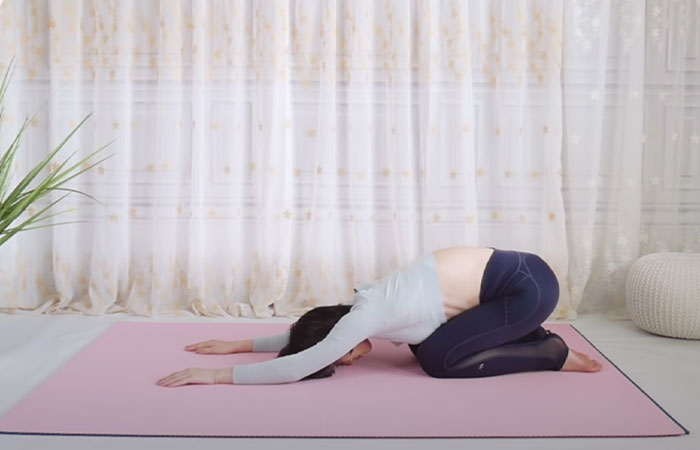
This versatile yoga pose targets the shoulders, upper chest, spine, and hip muscles. It relaxes the muscles and releases tension and also has a calming effect. Here’s how to do it:
- Kneel on a mat and place your palms to get on all fours.
- Adjust your knees by placing them slightly in an outward direction.
- Keep your palms fixed on the floor, lower your body, and let your ankles touch your hips. Keep your head down.
- Breathe and count to 10. And get back on all fours.
- Do 5 repetitions of this posture improvement exercise twice a day.
Note: If you are new to this exercise, you may find it difficult to lower your body completely. However, practice it regularly to get a full-body stretch.
Another common modification is to kneel in front of a chair and place your bent elbows on the chain in front of you. As you push your butt backward, push down into your elbows.
Quick Tip
For the child pose, you can use a folded blanket or yoga block to rest your forehead on. This allows you to stretch your spine without putting too much pressure on it. Remove the yoga block or folded blanket once you feel comfortable enough to rest your forehead on the ground
4. Upper Back Stretches For Rounded Shoulders
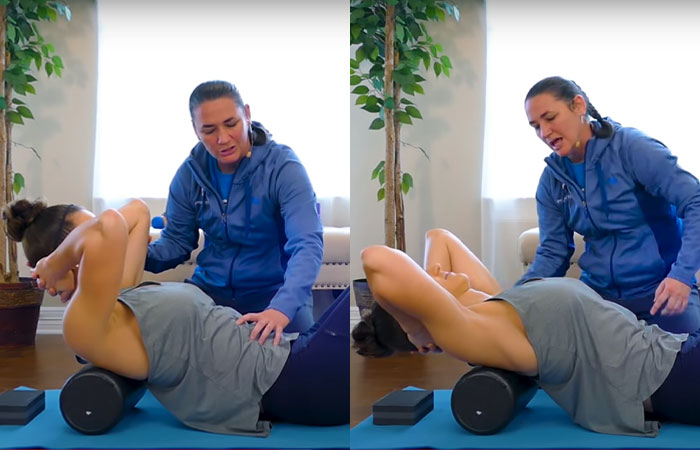
Sitting, working, and reading for long hours or carrying heavy objects can make the shoulders rounded. Opening up the shoulders will take the load off your spine, probably causing neck pain and even lower back pain. Here’s how to stretch your upper back to correct rounded shoulders:
- Place a foam roller on a mat.
- Sit on the mat, flex your knees, and keep your feet flat on the floor.
- Lean back until your upper back rests on the foam roller. Place your hands behind your head. This is the starting position.
- Rock back and forth to extend your upper back, keeping your hips firm on the floor. However, do not extend or crunch too much.
- Do 10 repetitions of these posture improvement stretches twice a day.
5. Chest Stretches For Opening The Shoulders
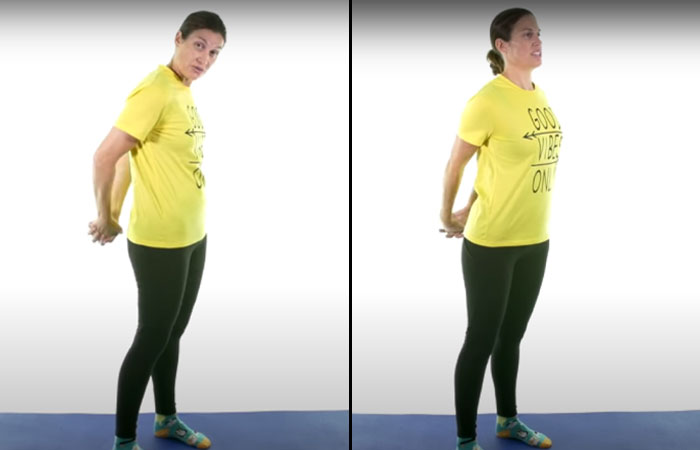
when your shoulders are rounded. This makes it difficult to breathe properly. Opening up your shoulders and chest can help improve your posture. You can do this isometric chest stretch at home any time of the day:
- Stand straight with your feet shoulder-width apart.
- Bring your hands behind you and clasp them together.
- Stretch them by pulling them behind and down.
- Hold the stretch for 15-20 seconds. Keep breathing.
- Do this 10 times twice a day.
6. Shoulder Squeeze And Overhead Arm Cross For A Hunched Back

Hunched back is a common postural problem found in different age groups. Lack of exercise or too much of it, spending hours on the laptop, and incorrect sitting and standing postures are major reasons for a hunched posture. Exercising the upper back and shoulders can help correct it gradually. Here’s an exercise you can do:
- Stand straight with your feet shoulder-width apart.
- Lift your hands as shown in the image.
- Push the hands back and feel the stretch on your shoulder and upper back muscles. Hold it for a second.
- Open up your arms, bring them over your head, and cross over to stretch your chest muscles.
- Do this 10 times twice a day.
7. Lower Back Stretch For Lower Back Curvature
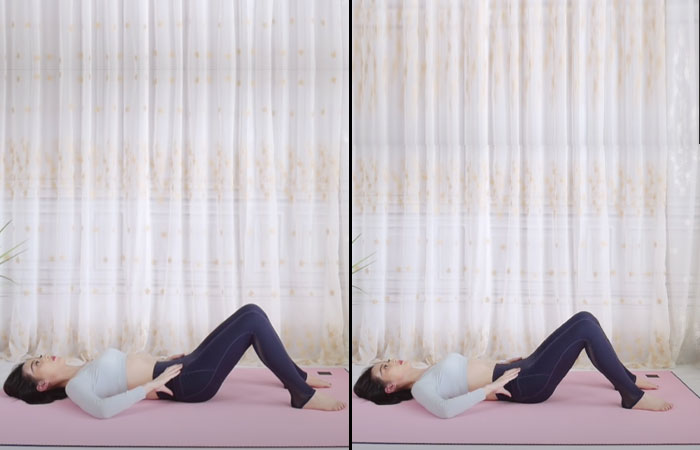
Pelvic anterior tilt or lower back poor posture is a common postural issue and a top reason for lower back pain. Excessive curvature of the lower back and protrusion of the hips are the tell-tale signs of pelvic anterior tilt. This simple lower back stretch can help reduce it. Here’s what you need to do:
- Lie down on a mat, bend your knees, and keep your feet flat on the floor.
- You will notice there is a huge gap between the mat and your lower back. You need to focus on that area to correct your posture.
- Place your hands on your waist and gently push your lower back down on the mat.
- Hold this pose for 15-20 seconds.
- Do this 10 times for 2-4 sets, twice a day.
8. Reverse Arm Clap And Arm Open For Upper Chest
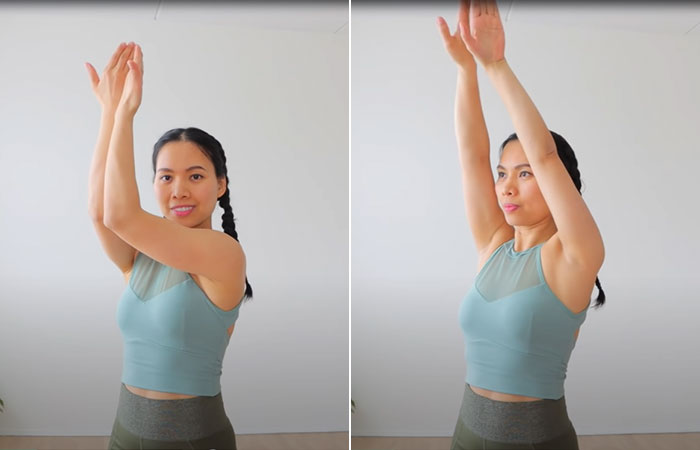
Your collarbones and rib cage can get caved in due to poor sitting, standing, and sleeping posture. A great way to correct a concave upper body is to combine a few easy exercises for better posture. Here’s what to do and how:
- Stand straight with your feet shoulder-width apart.
- Bring your arms towards your face and do a reverse arm clap, as shown in the image.
- Pause for a moment, bring your arms down, open them up, and bring them over your head.
- Pause for a moment and bring your arms down.
- Repeat the combination.
- Do this 10 times for 2-3 sets twice a day.
9. Wall Angel

Stiff shoulders can cause neck and shoulder pain. Wall angels can help release the tension in your shoulder muscles and upper back. Follow the steps given below:
- Stand against a wall. Make sure your feet are not more than six inches away from the wall.
- Place your arms on the wall, as shown in the image.
- Slowly bring your hands from straight above your head to the level of your ears, taking 5 seconds to go up and another 5 to go down for each rep.
- Do this 10 times, repeat 2-4 sets, twice a day.
Brendan, a fitness content creator, took up stretching exercises to correct his posture, including wall angel, and saw visible changes. In one of his vlogs, he exclaims, “When I compare my Day 1 to Day 25, I can see a dramatic improvement in my natural neck and shoulder placement (i).”
Quick Tip
You can do the wall angel on the floor by lying on the ground with your face upwards. This allows you to maintain a good posture without injuring yourself.
10. Push Back For Rounded Upper Back
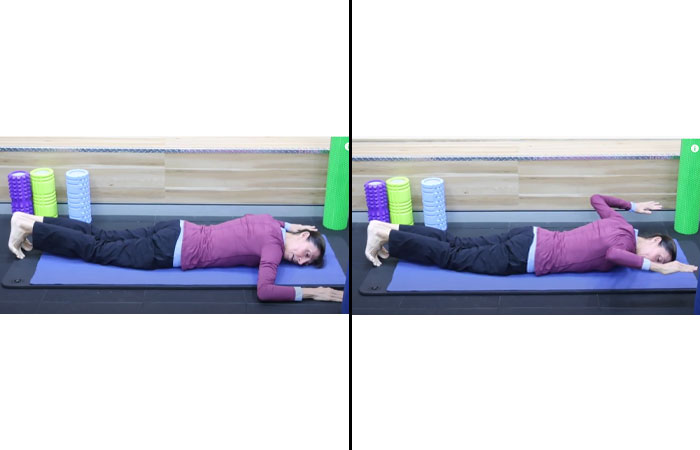
This exercise is similar to wall angels, but you need to do it lying down without the support of the wall. Pushback helps open up rounded shoulders and a concave chest for good posture. It also corrects upper spine protrusion and pain. Here’s how to do it:
- Lie down on your belly on a mat. Keep your head on the mat.
- Position your arms just like you did in the wall angel exercise.
- Lift them off the floor and push them back to feel the stretch in your upper chest and the back of the shoulders.
- Count to 5 and release.
- Do this 10-20 times, 2-4 sets, twice a day.
11. Spine Extension With Foam Roller

Incorrect posture can burden the spine. Therefore, your spine needs special attention when it comes to physical therapy and posture improvement. Foam roller exercises are great for releasing tension and getting a massage. Here’s how you can do a simple exercise with a foam roller at your home or at the gym:
- Sit on a mat, flex your knees, and keep your feet flat on the floor.
- Place a foam roller behind you and lean on it.
- Cross your hands behind your head and move a little forward, so that the foam roller is beneath your upper back.
- Lift your hips off the floor and move down and up to massage your spine.
- Do this 10 times twice a day.
12. Glute Bridge Exercise To Align Your Hips And Pelvis

This exercise works on your glutes, strengthens your lower body, and improves your posture. It requires you to align your hips in a straight line with the shoulders and feet. Follow the steps given below to perform it:
- Lie on your back with your knees bent and your feet flat.
- Ensure your feet are hip-width apart, and position your arms at your sides.
- Inhale and tighten your core.
- Push through your heels and squeeze your buttocks as you lift your hips. They should form a straight line with your
- shoulders and knees.
- Hold the pose for 20-30 seconds.
- Exhale and gently lower your hips back to the ground.
- Do 3 sets of 15 reps once a day.
Perform these 12 posture-correcting exercises for 30 days and see a huge difference in your slouching figure. Here are a few key points to keep in mind before you start exercising.
Points To Remember
- Talk To A Physical Therapist
Check with your physical therapist to know your problem area(s). There is no one-size-fits-all solution, and you might need specific exercises to attain the correct posture. Your physical therapist will guide you regarding this.
- Always Warm Up Before Exercising
Do neck tilts, shoulder rotations, arm stretches and circles, and forward bends for posture improvement. Stretching your muscles without prepping them can cause injury.
- Do Not Overdo These Exercises
Patience is key when it comes to correcting your posture. Overdoing these exercises may cause muscular soreness, tear, or pull and aggravate a pre-existing pain or injury. Increase the repetitions and frequency gradually as per the instruction of your physical therapist.
- Do Not Miss Your Workout Schedule
Humans are creatures of habit. So, set reminders and stick post-it notes to remind yourself why you need to do this regularly for 30 days.
- Pain Is Not Always Good
“Pain is gain” is not true always. If you experience sudden and sharp pain, stop doing that exercise immediately.
- Avoid Certain Exercises If You Have An Injury
Many people have shoulder injuries, knee issues, and lower back problems. Doing exercises that hyper extend these areas can further complicate and aggravate the injury. Talk to your physical therapist to know if you should do exercises that particularly target an affected area.
- Make A Conscious Effort
Merely practicing these exercises will not help. You have to make a conscious effort while standing, sitting, and sleeping to improve your posture.
- Get The Right Furniture
Are you sleeping on a very soft bed or sitting on a chair that is poorly designed? Or is your workstation too low? Changing up your furniture can help prevent postural deformities and reduce pain and stiffness.
